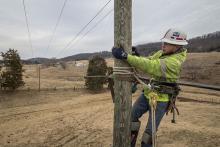Catching Up With Terry Huval from Lafayette - Community Broadband Bits Podcast 313

We’ve been following the community of Lafayette, Louisiana, and their LUS Fiber community network from the early days. Director of Utilities Terry Huval was one of the people responsible for bringing high-quality Internet access to the community back in 2009. Terry is about to retire so we wanted to have one more conversation with him before he pursues a life of leisure.
The last time Terry was on the show, he and Christopher discussed the possibility of an LUS Fiber expansion. That was back in March 2015 for episode 144 and the network has since spread its footprint beyond city limits. Those efforts have inspired better services from competitors in addition to bringing fiber to communities that struggled with poor Internet access.
Christopher and Terry talk a little history as Terry reflects on the reactions of incumbent ISPs who tried to disrupt the LUS Fiber deployment. A winning strategy that has always served the advancement of the network, Terry tells us, has been to focus on the unique culture of Lafayette and its people. Marketing based on local pride has always kept LUS Fiber in locals' minds. Terry discusses establishing pricing and how it relates to marketing and maintaining subscribers; in broadband, the situation is much different than with other utilities.
Terry spends some time answering a few questions on free Wi-Fi at the airport and the ways the network’s economic development benefits have kept the community’s youth in Lafayette. He also addresses how the city has dealt with state rules that apply to LUS Fiber but not to private sector ISPs and the way the city has dealt with those rules.
For more details about how the community of Lafayette developed its fiber optic network, check out our 2012 report, Broadband and the Speed of Light. You can also learn more about how to address some of the many erroneous and misleading claims about LUS Fiber and similar networks from our report Correcting Community Fiber Fallacies: Attacks on LUS Fiber.
This show is 30 minutes long and can be played on this page or via Apple Podcasts or the tool of your choice using this feed.
Transcript below.
We want your feedback and suggestions for the show-please e-mail us or leave a comment below.
Listen to other episodes here or view all episodes in our index. See other podcasts from the Institute for Local Self-Reliance here.
Thanks to Arne Huseby for the music. The song is Warm Duck Shuffle and is licensed under a Creative Commons Attribution (3.0) license.



 In addition to using restrictive pole attachment agreements, incumbents were exploiting the lack of definition in the statute to slow make-ready work, question who pays for make-ready work, and generally delay municipal projects. Time is money and losing momentum can drive up the cost of of a project, which in turn erodes a community's will to see it realized.
In addition to using restrictive pole attachment agreements, incumbents were exploiting the lack of definition in the statute to slow make-ready work, question who pays for make-ready work, and generally delay municipal projects. Time is money and losing momentum can drive up the cost of of a project, which in turn erodes a community's will to see it realized.